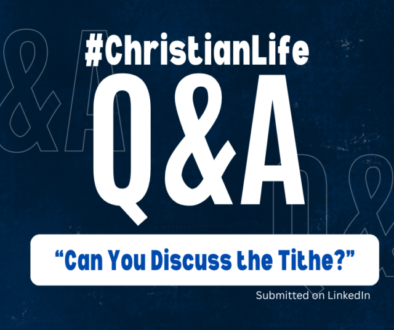It’s the beginning of 2019, and just like I try to do every January, I have been pursuing God and making plans for the new year. I have been very excited at the potential that this year holds, yet it seems that this season has also been filled with an unusually large amount of spiritual attacks from the enemy. One financial breakthrough leads to ongoing attacks on finances immediacy afterwards. Personal pursuits of the Lord are disrupted by strife with the family. And of course, for a guy, a major part of this warfare comes in the form of sinful temptations toward lust, apathy, and depression. I am sure you have had these kinds of seasons of life as well, and if all of us are honest, there are times when we don’t win these battles with the enemy when they come.
I have learned that when times of failure happen it must be my goal to ask for God’s forgiveness immediately, and confess to my accountability partner as quickly as possible. Running to God rather than away from Him when we sin should be the normal pattern for the Christian life, and doing so is a way to prevent the enemy from getting a foothold in our lives. The quick confession to another person also sets us up to find support and rebound from our failures, rather than walking in shame and trying to hide our guilt.
Recently, after walking through the process of losing a battle with temptation, and walking through the forgiveness and confession processes, I took some time to prayer journal, asking God to speak to me about true repentance and how to fight a better fight next time. I believe some of the things He showed me will be helpful to you as well, so I wanted to share.
First, you need to understand that there is a difference between confession or asking forgiveness, and true repentance. Confession is recognizing our sin and is taking a step towards repentance, but it is not repentance itself. The same is true with asking for forgiveness. We can always find forgiveness when we look at the cross and let Christ take the punishment we deserve, reconciling ourselves again to God, but this is just another step toward repentance, and not repentance itself.
While these two things put us back on equal footing with God as though the sin never happened, they are still not repentance. Repentance is the next step in this process, which sets us up to prevent the sin from happening again.
Repentance is a Two-Part Process.
First of all, it is changing the way we think, followed by changing what we do. Let’s look at these two steps in order.
1. Change the way you think.
The first step in repentance is changing the way we think. We must recognize that it is not our actions that are the root of the problem, but the beliefs we hold inside that guide our decision-making. This means before we can change our actions, we must first identify the false beliefs within us, which led to the action in the first place. These false beliefs can come from our life experiences, whether good or bad, or can come from lies the enemy directly speaks to us that we are unaware of, yet we nevertheless believe are true.
We have to identify these thoughts and beliefs — pulling them out in the open to be seen for what they are — and then bring them into submission to the word of Christ (see 2 Corinthians 10:3-6). It is by bringing these false beliefs into subjection to the truth of the gospel that they lose their hold in our lives. This process is accomplished through meditation on relevant scriptures, spending time in prayer, and asking the Holy Spirit to write the truth of God into our hearts.
Unfortunately, this first step in repentance seldom happens in a moment of time. It cannot be fully realized by simply quoting a verse to ourselves or quickly making a commitment to do better next time. Sadly, these are the casual attempts most of us tend to make. The reality is that most often this process will require us to wrestle with the truth before it truly sets in, which is why even fasting and other spiritual disciplines are sometimes tied with biblical repentance. It is in this meditation and wrestling with truth to overcome those lies which the Bible speaks of as “being transformed by the renewing of our minds” (Romans 12:2). This is overcoming strongholds of the kingdom of darkness and letting the truth set us free (John 8:31-32).
2. Change the way you act.
Once the unbelief and erroneous thought patterns have been identified, wrestled with, and broken by the truth, then our fleshly habits can be broken as well. This is when we can effectively commit to the change of action that is required as the second part of the repentance process. Do not hear me wrong, to do this will still require discipline on our part, but when these efforts are tied to a renewed mind set on Christ and His truth, then it is not legalistic works, but it is putting to death the deeds of the flesh in a joyful pursuit of Christ-likeness.
This makes repentance sound like a lot of work. I understand that. However, nowhere does scripture indicate that the discipleship process would be easy. Jesus said it is daily taking up your cross and following Him(Luke 9:23). I believe that repentance is the most personal act of spiritual warfare that we, as children of God, are called to engage in. It is a battle that starts by fixing our eyes (mind, and hearts) on Christ, and letting His truth set us free.
Confession and seeking forgiveness is an admission of failure in battle, but that is not enough. True repentance is making a commitment to continue in the fight by biblically transforming your mind and life.
If you truly want to be the man or woman God desires you to be, there are no shortcuts in this process. As Martin Luther once declared in dramatic fashion, “the entire life of the Christian is one of repentance.” I hope you will come to see that this lifestyle of repentance is better than giving up the fight and continuing in your sin.
(This post was originally published January 14, 2015. It has been revised and edited for reposting.)
Photo by Elena Taranenko on Unsplash



